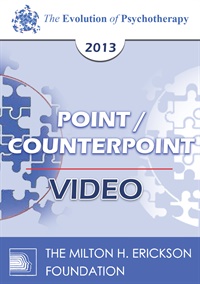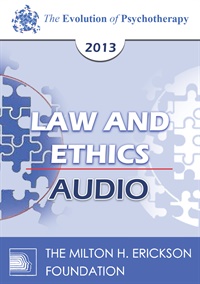
- Average Rating:
- Not yet rated
- Topic Areas:
- Law & Ethics | Therapist Development
- Categories:
- Evolution of Psychotherapy | Evolution of Psychotherapy 2013
- Faculty:
- A. Steven Frankel, PhD, JD, ABPP
- Duration:
- 1:59:21
- Format:
- Audio Only
- Original Program Date:
- Dec 10, 2013
- Short Description:
- This workshop in law, ethics and regulation focuses on three of the four most frequent causes for actions against mental health professionals, nationwide. Since the 2010-2011 law/ethics/regulation workshop focused primarily on boundary violations (including sexual contact between professional and patient/client), this 2012-2013 workshop focuses on incompetence, criminal convictions and cases involving high-conflict custody problems. The workshop emphasizes awareness and management of risk factors in the major areas of high risk practice via music videos illustrating the principles taught in the program. These include coping with negative publicity on the internet, the risks of “creative” techniques, riskier vs. safer models of intervention, coping with the need to “rescue” patients/clients, management of angry/dissatisfied patients/clients, and more.
- Price:
- $15.00 - Base Price
Tags: Ethics Law Therapist Development
- Average Rating:
- Not yet rated
- Topic Areas:
- Point/Counterpoint Sessions | Psychotherapy | Therapist Development
- Categories:
- Evolution of Psychotherapy | Evolution of Psychotherapy 2013
- Faculty:
- David Barlow, PhD | Francine Shapiro, PhD | Betty Alice Erickson, MS, LPC, LMFT
- Course Levels:
- Master Degree or Higher in Health-Related Field
- Duration:
- 1:24:49
- Format:
- Audio and Video
- Original Program Date:
- Dec 11, 2013
- Short Description:
- Neurotic disorders dominated the landscape of psychopathology for almost a century before dying a sudden and traumatic death in 1980 with the publication of the DSM III. Now researchers delineated empirically supported common dimensions shared by all anxiety, mood, and related emotional disorders, including higher order temperaments, mood distortions, and extensive patterns of avoidance. In this presentation Barlow suggests a new integrated diagnostic scheme and the identification of psychological treatment principles targeting temperament directly.
- Price:
-
Sale is $29.00
price reduced from Base Price - $59.00
- Average Rating:
- Not yet rated
- Topic Areas:
- Psychotherapy | Point/Counterpoint Sessions | Consciousness | Mind-Body | Psychology | Therapist Development
- Categories:
- Evolution of Psychotherapy | Evolution of Psychotherapy 2013
- Faculty:
- Ernest Rossi, PhD | Cloe Madanes, HDL, LIC | Richard Landis, PhD
- Course Levels:
- Master Degree or Higher in Health-Related Field
- Duration:
- 1:23:25
- Format:
- Audio and Video
- Original Program Date:
- Dec 12, 2013
- Short Description:
- Facilitating the RNA/DNA epigenetics of creating new consciousness is the next step in the evolution of psychotherapy. Restricting psychotherapy to the limitations of the cognitive-behavioral level is becoming a disservice to psychology. We must embrace the bioinformatics of the new technological devices that make it possible to assess and facilitate the dynamics of gene expression and brain plasticity economically within a single session of psychotherapy.
- Price:
-
Sale is $29.00
price reduced from Base Price - $59.00
- Average Rating:
- Not yet rated
- Topic Areas:
- Point/Counterpoint Sessions | Communication | Evocative Communication | Psychotherapy | Therapist Development | Art and Creativity
- Categories:
- Evolution of Psychotherapy | Evolution of Psychotherapy 2013
- Faculty:
- Jeffrey Zeig, PhD | Donald Meichenbaum, PhD | Kathryn Rossi, PhD
- Course Levels:
- Master Degree or Higher in Health-Related Field
- Duration:
- 1:29:19
- Format:
- Audio and Video
- Original Program Date:
- Dec 14, 2013
- Short Description:
- Building on the contributions of Milton Erickson, MD, therapists can advance their work through the introduction of evocative techniques gleaned from studying codes of influence in the arts. The artist and the therapist share similar domains: a striving to alter perception; to modify and expand perspectives; and to stir the human heart. Therapists can explore how to use untapped aspects of their medium through teasing out the connections between the palette of the artist and the traditional toolbox of the clinician.
- Price:
-
Sale is $29.00
price reduced from Base Price - $59.00
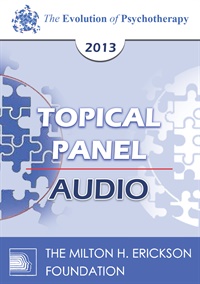
- Average Rating:
- Not yet rated
- Topic Areas:
- Psychotherapy | Topical Panels | Therapist Development | Training
- Categories:
- Evolution of Psychotherapy | Evolution of Psychotherapy 2013
- Faculty:
- Jon Carlson | Scott Miller, PhD | William Miller, PhD
- Duration:
- 1 Hour 4 Minutes
- Format:
- Audio Only
- Original Program Date:
- Dec 13, 2013
- Short Description:
- EP13 Topical Panel 07 - Training in Psychotherapy - Jon Carlson, PsyD, Scott Miller, PhD, and William Miller, PhD Moderator: Betty Alice Erickson, MS Education Objectives: Compare and contrast clinical and philosophical perspective of experts.
- Price:
- $15.00 - Base Price
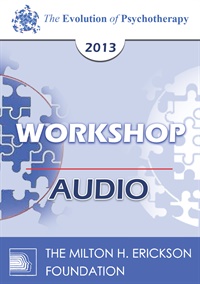
- Average Rating:
- Not yet rated
- Topic Areas:
- Eye Movement Desensitization and Reprocessing (EMDR) | Workshops | Psychotherapy | Therapist Development
- Categories:
- Evolution of Psychotherapy | Evolution of Psychotherapy 2013
- Faculty:
- Francine Shapiro, PhD
- Duration:
- 1 Hour 59 Minutes
- Format:
- Audio Only
- Original Program Date:
- Dec 11, 2013
- Short Description:
- Research has clearly demonstrated that certain kinds of life experiences lay the foundation for a wide range of mental and physical problems. Clinical and neurobiological research indicates that EMDR therapy directly addresses the physiological basis of clinical symptoms and dysfunction. Group exercises, case description and treatment videos will help participants examine the implications of this research and its application to clinical practice. Clinical examples will address individual, family and societal issues.
- Price:
- $15.00 - Base Price
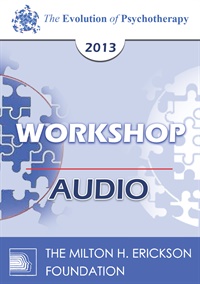
- Average Rating:
- Not yet rated
- Topic Areas:
- Workshops | Psychotherapy | Cognitive Behavior Therapy (CBT) | Emotionally Focused Therapy (EFT) | Therapist Development
- Categories:
- Evolution of Psychotherapy | Evolution of Psychotherapy 2013
- Faculty:
- David Barlow, PhD
- Duration:
- 2 Hours 54 Minutes
- Format:
- Audio Only
- Original Program Date:
- Dec 11, 2013
- Short Description:
- This workshop will present recent developments in the application of a transdiagnostic unified, cognitive behavioral and emotion-focused approach to treating emotional disorders. Workshop participants will learn how to apply treatment components to a wide range of emotional disorders . Workshop participants will learn how to apply treatment components to a wide range of emotional disorders in adults through instruction, case examples, and video clinical vignettes.
- Price:
- $15.00 - Base Price
- Average Rating:
- Not yet rated
- Topic Areas:
- Workshops | Psychotherapy | Therapist Development
- Categories:
- Evolution of Psychotherapy | Evolution of Psychotherapy 2013
- Faculty:
- Scott Miller, PhD
- Course Levels:
- Master Degree or Higher in Health-Related Field
- Duration:
- 2:38:35
- Format:
- Audio and Video
- Original Program Date:
- Dec 11, 2013
- Short Description:
- Pulitzer prize winning author Thomas Friedman recently observed, “The era of average is over. In the 21st century, everyone is going to have to find something extra to stand out in their field.” What can mental health and substance abuse professionals do to enhance their performance? Available evidence makes clear that attending a typical continuing education workshop, specializing in the treatment of a particular problem, or learning a new treatment model does little to improve effectiveness. Over the last decade, Scott D. Miller, Ph.D., together with colleagues at the International Center for Clinical Excellence, have been tracking the outcomes of thousands of clinicians around the world. Along the way, they have identified specific practices that separate highly effective from average clinicians.
- Price:
-
Sale is $29.00
price reduced from Base Price - $59.00
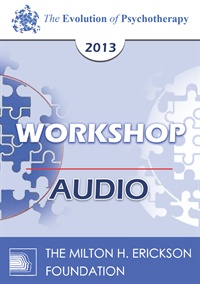
- Average Rating:
- Not yet rated
- Topic Areas:
- Workshops | Psychotherapy | Therapeutic Relationship | Therapist Development
- Categories:
- Evolution of Psychotherapy | Evolution of Psychotherapy 2013
- Faculty:
- Michael Yapko, PhD
- Duration:
- 2 Hours 47 Minutes
- Format:
- Audio Only
- Original Program Date:
- Dec 11, 2013
- Short Description:
- Why does a grown adult need to be reminded by a therapist that he or she no longer needs to feel or act like a helpless child? Why does someone treat a new boyfriend or girlfriend unfairly as if he or she is the same as the last one who hurt him or her? One answer: Global thinking. Most people – therapists included – are global thinkers, people who metaphorically “see the forest but not the trees.” Global thinking is highly correlated with depression as well as PTSD.
- Price:
- $15.00 - Base Price
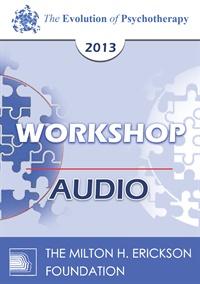
- Average Rating:
- Not yet rated
- Topic Areas:
- Workshops | Psychotherapy | Therapist Development
- Categories:
- Evolution of Psychotherapy | Evolution of Psychotherapy 2013
- Faculty:
- Erving Polster, PhD
- Duration:
- 2 Hours 36 Minutes
- Format:
- Audio Only
- Original Program Date:
- Dec 12, 2013
- Short Description:
- EP13 Workshop 17 - Heightened Attention: Elixir of Therapeutic Growth - Erving Polster, PHD
- Price:
- $15.00 - Base Price
Please wait ...



